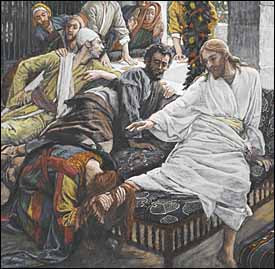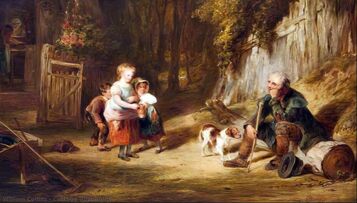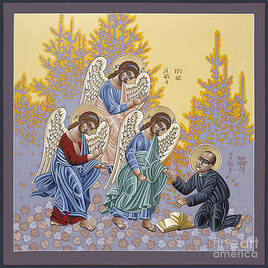 prayers for help were answered prayers for help were answered About ten years ago a car accident took place in Missouri in which a priest appeared out of nowhere, prayed for a while with a young woman trapped inside her car, and then seemingly disappeared. The story went viral and yet no one seemed to know the priest, where he came from or where he went. Many speculated that he may have been an angel who came in response to the prayers of both the injured woman and the first responders whom she had asked to pray out loud for her. While there are many possible explanations, the fact that prayers for help were answered is an assurance that God intervened regardless of who it was that came and offered assistance. God can do all things and does send angels in many forms; they do not necessarily have to appear as winged beings as we most often think of them. Either way, it is important that we broaden our vision and recognize that not only do angels come among us, but that we may have already encountered them; that is, we may have “entertained angels unaware.” (Hebrews 13:2) There are many stories recorded in the Scriptures that mention angels. One of the most significant is that of the three angels who visited Abraham and Sarah, (Genesis 18:1-15).*Abraham prepared a meal for them and gave them the greatest hospitality that he could offer. At the end of the meal the angels in disguise revealed that Sarah would bear a son in her advanced age. Another significant account is that of the Archangel sent by God in the story of Tobias: the Archangel Raphael appeared as a man named Azariah in answer to the prayer of the recently blinded Tobias while simultaneously answering the prayer of a young woman named Sarah who begged for help because she was tormented by a demon. (Book of Tobit) The Gospels also mention angels numerous times, so we can correctly ascertain that angels continue to serve God by rendering aid to those who pray for help.  we offer the refreshment of friendship and care we offer the refreshment of friendship and care However, what the writer of Hebrews was saying was less about real angels than it was about how we should treat all those who we welcome into our homes and our churches. In other words, the real message is that we should recognize the possibility that we might be the assistance God provides for someone who is in need. In this way we are to act like the angels insofar as we are called to humbly serve, not waiting for someone else to do what we might be able to do. To be as an angel means we act selflessly in love, perhaps by simply being present and listening to the other, offering comfort and assistance if necessary. To be as an angel means that we open our hearts to others, inviting them in, so to speak, which does not always mean something dramatic is going on the other person’s life or that we are to do anything outwardly heroic; rather, it means we are totally present to the other and we offer the refreshment of friendship and care.  hospitality of the heart hospitality of the heart Two aspects come to mind concerning acting in love and selfless service. First, we might be the ‘host’ who is to offer hospitality in our welcome to the stranger or friend. "Entertaining angels unaware" implies that we should always act with hospitality of the heart, treating everyone with respect as welcomed guests would be treated. Jesus clearly valued this kind of behavior, something we see in a dramatic encounter He had in which He was the guest at the home of a rich man. A penitent woman washed Jesus’ feet with her tears, wiped them with her hair, and then anointed them with costly oil. When the host criticized her, Jesus responded that this host had not greeted Him appropriately, and had neglected to wash His feet and anoint Him on the head, (customary at the time), pointing out his lack of hospitality. (Luke 7:36-50) The second aspect, one we often miss, is that of knowing how to be a good guest. The guest should graciously accept the hospitality offered and be clear in his/her gratitude. And at a larger gathering, a guest (this pertains to all of us) also needs to remember that when they enter a room, they are not the most important person in it! Therefore, guests should act accordingly, with humility and respect to the host and anyone else present: each of the other guests is also a child of God and therefore is as ‘an angel in disguise.’ If we come in thinking ourselves as the first, then as Jesus says, we will be the last. (Matthew 20:16) Even if we are the sole guest, we are to remain gracious and humble, just as Jesus was when He was eating and drinking with His friends.  hospitality is an important component to discipleship hospitality is an important component to discipleship It would be good to pray with the Scriptures (particularly the Gospels) which refer to hospitality, reflecting upon our own behavior when we are the host and when we are the guest. Hospitality is an important component of discipleship and it can make a difference in the lives of those who we meet. We may never know when we have made such a positive impression that it sparks someone to conversion in some way or another. Instead of 'entertaining angels unaware' we should treat each one as if he or she is an esteemed guest; it is something we can do whether it is in our actual home, or simply by inviting others into the domicile of our heart. When we welcome the guest, we also welcome Christ.  may we act with love may we act with love May we act with love in entertaining the ‘angels’ we encounter! May we grow in self-awareness, discerning when we need to speak and when we need to listen! And may we be as Christ to others, recognizing when they are as Christ to us! Let us continue to meet in the Heart of Jesus! Peace! ©Michele L. Catanese * The angels in this encounter were in reality the Holy Trinity. Also, remember that at the time of this event, Abraham and Sarah were still called by their original names, Abram and Sarai. Their names were changed by God later as a sign of their new mission. Images: 1. My photo; Summer sky in Texas. 2. Icon; The Holy Trinity by St. Andre Rublev. 3. My photo; Charcuterie Board, Ragusa, Sicily. The charcuterie board and a glass (or two) of wine is the quintessential Italian hospitality feast. 4. Painting, The Penitent Woman by James Tissot. 5. Painting, Cottage Hospitality by William Collins (1824-1889) 6. Image; Holy Theologian Bernard Lonergan by Fr. William Hart McNichols. In a symbolic way, the ‘angels’ are a depiction of the Holy Trinity, in this case, coming to the aid of Fr. Lonergan, one of the great Catholic theologians. It is reminiscent of those that came to Abraham and Sarah. You can find this at fineartamerica.com/featured/holy-theologian-bernard-lonergan-122-william-hart-mcnichols.html Note: In compliance with GDPR rules, I wish to make it clear that I do not gather any information on any of my readers at any time.
Marsha
10/16/2023 12:42:17 pm
Thank you- for inviting the thought that I at times am called by God to be an angel to others, makes me more attentive as I go about my day.
Carmella Wygant
10/18/2023 06:26:58 pm
I greatly appreciated your words. Comments are closed.
|
Heart Speaks to Heart
|

 RSS Feed
RSS Feed

